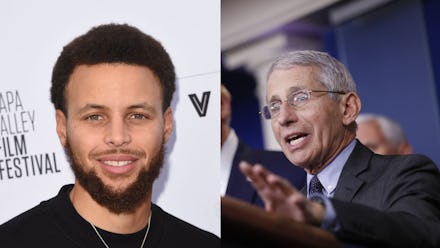Steph Curry debunked a lot of coronavirus myths in his live Q&A with Anthony Fauci

On Thursday afternoon, Anthony Fauci participated in a live Q&A with Steph Curry to discuss some of the most common COVID-19 myths. The director of the National Institute of Allergy and Infectious Diseases fielded questions from Curry and users in the comments during the nearly 30-minute chat. It’s still available on his Instagram Live story, and he plans to archive it as a resource for anyone seeking the information.
As numerous celebrities are turning to marginal acts of philanthropy, Curry took his chance to clarify important facts for his followers. (He’s still donating, too, by teaming with an Oakland food bank to donate meals to students who can’t attend school during the shutdown.) Curry’s not a professional journalist or interviewer by any stretch, so the questions aren’t functioning much differently than celebrity-on-celebrity magazine profiles. Where he brings layman’s terms and a shaky understanding of the virus, it’s all in service of, as he puts it at one point, exposing Fauci’s expertise to a younger demographic that might still think it’s okay to hit the beach.
Fauci is probably the most reliable federal mouthpiece for coronavirus information, so getting him in front of more eyeballs can never hurt. In their talk, Fauci debunked myths that coronavirus is a similar threat to the seasonal flu, it doesn’t affect young people seriously, and addressed plans to lift social distancing too soon. “The reason it’s different is that it’s very much more transmissible than the flu. It’s significantly more serious,” Fauci said. He also stressed that, while the mortality rate isn’t solidified, the figure ranges anywhere from 1-3%, compared to seasonal flu’s 0.1% rate.
As the wrenching reports reveal by the day, it’s clear that coronavirus doesn’t spare the young. More than half of Pennsylvania’s coronavirus patients are under 50, with 12% between the ages of 19 and 24. During the stream, Fauci stressed that serious illness can come for any age bracket. “We’re starting to see, there are people who are younger, your age, who don’t have any underlying conditions that are getting seriously ill,” he said. “It’s still a very, very small minority, but it doesn’t mean that young people like yourself should say ‘I’m exempt from getting ill.’”
Fauci expects the chances of contracting the virus a second time to be rather low. “If this acts like every virus similar to it that we know, the chances are overwhelming that you will not get reinfected with the same virus,” he said. Curry also asked him about theories that warm weather might slow its spread, which Fauci was more tentative about. “With other viruses like seasonal influenza and other coronaviruses that are more benign, what you said is true. As the weather gets warmer, viruses tend to do poorly,” he said. “We don’t know if this is what’s going to happen with this virus. It’s not an unreasonable assumption to think it’s going to go down, but you don’t want to count on it.”
He addressed the dearth of testing up to this point, and claims that obtaining a test should be a smooth process for whoever may need it. “There should be nothing now that’s inhibiting it. The system the way it was set up was not geared toward instantaneously and safely getting a test,” he said. “Right now the system is changed, predominantly because it’s being handed over to the commercial firms.”
At one point, Barack Obama popped into the stream to both give a Joe Biden-esque wave and thank the pair for hosting the chat. “Listen to the science. Do your part and take care of each other. Thank you, Steph and Dr. Fauci,” he wrote.
Fauci anticipates another wave this upcoming winter, and targets winter 2021 the best case scenario for a vaccine. He ultimately landed on a measured, hopeful tone for when he expects the virus to return in future outbreaks before the vaccine is ready. “We will get enough experience that when it does come back, we’ll be able to identify and isolate. We can contain it at a very low level,” he said. “We can treat individual ones and prevent the outbreak. I think we can avoid that, we’ll be much different than what we’re doing now.”